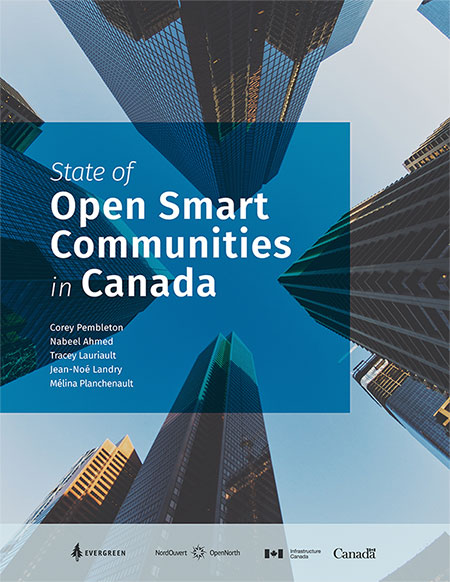
This report is a summary of the preliminary findings of the Community Solutions Network Advisory Service, led by Open North. The report, which is situated at the halfway point of the Community Solutions Network’s first year of funding, provides the results of various stages of data collection and research into Open Smart Cities in Canada.
The preliminary findings are structured around four topic or domain areas:
Inclusion – Canadian cities are on the threshold of embracing a new form of inclusion that builds digital, technical, and data literacy and breaks down the digital divide and organizational silos.
Data Governance – Cities are experiencing challenges associated with the data governance of smart systems. They recognize the need to learn from other Open Smart Cities, especially when it comes to building their internal capacity to develop robust and inclusive data governance strategies and policies.
Procurement – Procurement in an Open Smart City is about open and transparent contracting with clearly defined processes in place for the acquisition of hardware and software and the governance of data. Few cities have adopted an Open Smart City approach to procurement, although the incentive is there to do so.
Automated Decision-making and Artificial Intelligence – AI is not yet widely adopted at the municipal government level in Canada. This presents an opportunity to proactively learn more about AI and develop standards for the use of AI and automated decision-making prior to widespread implementation.
Open City Trends Across Canada
These findings provide preliminary observations of the Open Smart City’s ecosystem-specific trends in Canada:
- Nearly half of participating small and medium sized-communities have data governance policy or strategy development as a smart city priority.
- 75% of respondents state that they either make an effort to educate the public on the use of tech and data by their institution or have policies to do so.
- 43% of survey respondents say they do not have the appropriate hardware or software platforms to implement data analysis, reporting, and data-driven decision-making.
- 55% of survey respondents say that their city partially or fully incorporates open procurement practices.
- 66% of survey respondents are aware of potential bias in algorithms in AI, but only 1 responded to having staff dedicated to document potential assumptions and bias.
To learn more about open smart communities view the report below.
Funded by Infrastructure Canada in 2019 as part of the Impact Canada Community Solutions Network.